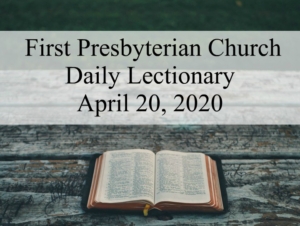
Gospel Reading John (14:1-7) 8-17
1Peter, an apostle of Jesus Christ, To the exiles of the Dispersion in Pontus, Galatia, Cappadocia, Asia, and Bithynia, 2who have been chosen and destined by God the Father and sanctified by the Spirit to be obedient to Jesus Christ and to be sprinkled with his blood:
May grace and peace be yours in abundance.
3Blessed be the God and Father of our Lord Jesus Christ! By his great mercy he has given us a new birth into a living hope through the resurrection of Jesus Christ from the dead, 4and into an inheritance that is imperishable, undefiled, and unfading, kept in heaven for you, 5who are being protected by the power of God through faith for a salvation ready to be revealed in the last time. 6In this you rejoice, even if now for a little while you have had to suffer various trials, 7so that the genuineness of your faith – being more precious than gold that, though perishable, is tested by fire – may be found to result in praise and glory and honor when Jesus Christ is revealed. 8Although you have not seen him, you love him; and even though you do not see him now, you believe in him and rejoice with an indescribable and glorious joy, 9for you are receiving the outcome of your faith, the salvation of your souls.
10Concerning this salvation, the prophets who prophesied of the grace that was to be yours made careful search and inquiry, 11inquiring about the person or time that the Spirit of Christ within them indicated when it testified in advance to the sufferings destined for Christ and the subsequent glory. 12It was revealed to them that they were serving not themselves but you, in regard to the things that have now been announced to you through those who brought you good news by the Holy Spirit sent from heaven – things into which angels long to look!
First, a geography lesson. Peter writes a letter to “The exiles of the Dispersion in Pontus, Galatia, Cappadocia, Asia, and Bithynia.” These are Jewish Christians, fellow travelers who no longer have any place to call home. Maybe they were generations removed from Israel. Maybe by the time the letter was written the temple had been destroyed, Israel had finally lost the unifying symbol of its faith, and its people scattered. Whoever they were, these “exiles” were far from home, and that made them vulnerable. Peter mentions their trials, which may have been persecution or suffering related to faith. It’s not as if they hadn’t suffered already; but by following this new faith they reached another level of alienation. They had once been removed from their homes. Now they had been removed from communities of support in the new homes they attempted to build. In such a time it would be easy—or at least understandable—to question the purpose of God. Where is God when things fall apart? Peter tries to be encouraging. The trials the exiles suffer are not the removal of God’s promise but a testing of faith. We don’t often want to think of trials this way. We don’t want to think that God has made suffering in our lives or the lives of others. (There is a long argument in Christian theology about just this point.) But, as we all have become exiles of a sort—exiled from normalcy, exiled from one another—maybe it’s comforting to think that the end result of this may be a stronger faith. The home we return to may not be a place, but the presence of God newly rediscovered in our own souls.
It is enough, Lord, to know that you are with us, and you will never leave us to face our trials alone. In moments of fear and weakness, in doubt and despair, let the comfort of your Spirit remain. Encourage us in all that we do, that the fire of your love would make us into the image of the one you have called us be, in Jesus, our Lord. Amen.
